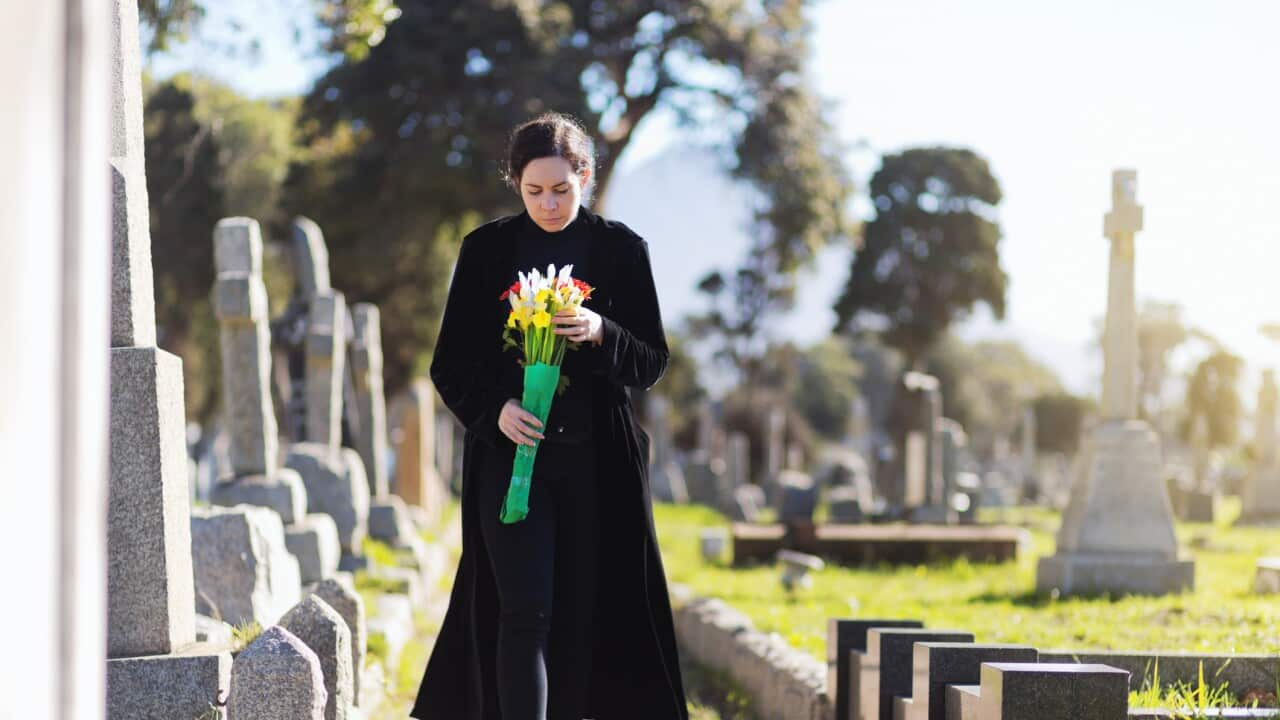ќе ви помогне да зборувате, разберете и да се поврзете во Австралија - погледнете ги сите епизоди.
Оваа лекција одговара на познавачите на јазикот од средно ниво. Откако ќе ја слушнете, тестирајте го Вашето знаење со нашиот квиз.
Белешки за учење
Различни фрази што треба да ги користите кога зборувате кога некој ќе почине:
- I heard about your grandfather passing away.
- I’m so sorry for your loss.
- The funeral gave me a sense of closure.
- It still feels surreal that they are gone.
- It sounds like you gave him a fitting farewell.
Фокус на учење:
Често користиме изрази како ‘Oh’, ‘yeah’, ‘so’, ‘well’ да покажеме дека сме слушнале што кажала некоја личност, пред да почнеме самите да зборуваме. Ги користиме постојано, но тие се најважни кога се обидуваме да покажеме дека се грижиме за она што некои го кажуваат.
Ние, исто така, се обидуваме внимателно да ги избираме нашите зборови за да не вознемириме никого. Така, понекогаш ние само алудираме наместо всушност да кажуваме работи што може да бидат вознемирувачки, како смрт во семејството.
Ако навистина зборуваме за тешки теми, често избираме збор што не е толку директен, па може да кажеме дека некој „починал“ наместо „умрел“, односно ‘passed away’ наместо ‘died’.
Колоквијални изрази:
To remember something with great fondness е да се погледне наназад на спомен кој ти е многу драг.
If something is close to your heart, тоа многу ти значи. Тоа е нешто за што навистина се грижите и се чувствувате емотивно поврзани.
Користиме фраза 'passing away' како понежен начин со повеќе почит, да се зборува за нечија смрт. Тоа го прави разговорот помалку директен и поудобен за оние кои тагуваат.
I’m so sorry for your loss. Оваа фраза често се користи за да се изрази сочувство кога некој ќе почине.
Прашуваме, ‘How have you been coping?’ да откриете како некој се справува со тешка животна ситуација.
Кога велиме, ‘It can take time to fully grasp’, мислиме дека разбирањето или прифаќањето на нешто можеби нема да се случи брзо.
Речник:
Strong значи насилно, но можеме да го искористиме и за да опишеме шега или приказна што е по малку провокативна.
Во овој контекст, ‘late’ се однесува на некој што умрел. Значи, кога велиме ‘the late Queen Elizabeth II’, мислиме на кралицата Елизабета Втора која почина.
Grief е длабоката тага што ја чувствувате кога ќе изгубите некого или нешто важно за вас.
To grieve for someone (or something) е да ја почувствувате таа длабока тага кога сте изгубиле некого или нешто важно за вас.
Condolences се зборови или постапки кои луѓето ги користат за да покажат сочувство и поддршка кога некој друг доживеал загуба, обично смрт на некој близок.
When something feels surreal, се чини речиси неверојатно или како сон, како навистина да не се случува.
A tribute може да биде нешто мало како убави зборови што едно лице ги кажува за некого или може да биде нешто големо како споменик или воен споменик изграден од заедницата за да се сеќава на луѓето што загинале.
Someone’s accomplishments се добрите работи што ги направиле или постигнале во животот. Тоа може да биде во нивната работа, училиште или други важни активности.
A farewell е збор кој се користи за изразување на добри желби кога некој си заминува или се разделува од другите.
Transcript:
(Note: This is not a word-for-word transcript)
SBS acknowledges the Traditional Custodians of Country and their connections and continuous care for the skies, lands and waterways throughout Australia.
Hi everyone, Josipa here. Last week, when all my family gathered on a small Croatian island for my aunt's funeral, I was the only one missing.
I can’t describe in words how terrible and sad I still feel because I couldn’t travel there for the funeral. I regret not having the opportunity to say goodbye to my aunt. Her name was Alma, and she loved telling jokes. Sometimes they were a bit strong, that is, a little naughty, but they were always delivered with a wink and a warm smile.
I’ll never forget how her spicy dishes made me cry; they were so hot. They were always as bold and fiery as her personality and her short red hair.
I remember those times together with great fondness and they are very close to my heart.
If something is close to your heart, it means a lot to you. It’s something you really care about and feel emotionally connected to.
I don’t know, maybe this episode is my way of saying goodbye to Alma. Allan and Claire think so. Actually, it was they who suggested we do this topic. Okay, Allan and Claire, let’s hear what phrases you want us to practise today.
Claire
Oh Allan, I was so sorry to hear about your grandfather. I’m so sorry for your loss.
Allan
Yeah, Thanks. Yes, it’s been a tough time.
Claire
So, how have you been coping?
Allan
Well, some days are better than others. The funeral gave me a sense of closure, but it still feels surreal that he’s gone.
Claire
Yeah, it can take time to fully grasp. Did you have a traditional service?
Allan
Yes, the ceremony was beautiful, and everyone shared beautiful tributes about him and his accomplishments.
Claire
Awww, it sounds like you gave him a fitting farewell.
The late Queen Elizabeth II once said that grief is the price we pay for love. Grief is the deep sadness you feel when you lose someone or something important to you. Do you agree with the late Queen’s statement? I do.
In this context, ‘late’ refers to someone who has died. So, when we say, ‘the late Queen Elizabeth II’, we mean Queen Elizabeth II who has died.
Of course, we need to be very gentle and sympathetic when we talk to someone who is grieving.
Did you notice all the little words that Allan and Claire cused when they started talking? They aren’t important words, just simple words like ‘Oh’, ‘yeah’, ‘so’, ‘well’ but they show that someone is connecting with what the other person has said.
We use them all the time, but they are particularly important when we are trying to show that we care about what some is saying.
We also try to choose our words carefully so that we don’t upset anyone. Did you notice how Claire didn’t actually mention that Allan’s grandfather had died? She simply said:
Oh Allan, I was so sorry to hear about your grandfather.
So, Claire is saying that she heard that Allan’s grandfather had passed away. We say ‘passed away’ as a gentler, more respectful way to say someone has died. It’s an indirect way of talking about dying and therefore less upsetting for those who are grieving.
Claire also said,
I’m so sorry for your loss.
‘I’m so sorry for your loss’ is a phrase we often use to say that we sympathise with someone whose loved one has passed away, that is, to express our condolences.
Condolences are words or actions that people use to show sympathy and support when someone else has experienced the loss of someone dear to them.
When you offer your condolences, you are telling someone that you feel sorry for their sadness, and you are there to support them during their difficult time.
We can offer our condolences by sending a card or flowers or we can also use phrases like 'I'm so sorry for your loss'.
Claire also asked Allan how he is feeling, but she used a different expression. Let’s hear her again,
So, how have you been coping?
We ask, 'How have you been coping?' to find out how someone is managing a tough life situation.
This question shows we care about their wellbeing and want to know if they're finding ways to stay strong or get better.
Allan replied,
The funeral gave me a sense of closure, but it still feels surreal that he’s gone.
If something gives you a sense of closure, it helps you feel like you've finished a tough part of your life.
Allan says that it feels surreal that his grandpa is gone. When something feels surreal, it seems almost unbelievable or dreamlike, as if it's not really happening.
This feeling can occur during moments that are so shocking or unexpected that they do not seem real and are hard to accept or understand.
Claire then said,
It can take time to fully grasp.
When we say, "It can take time to fully grasp," we mean that understanding or accepting complex ideas or dealing with emotional events might not happen quickly. Claire uses this phrase to show sympathy to Allan who is finding it difficult to believe that he has lost his grandfather.
And do you remember how Allan described the funeral? He said,
Allan
The ceremony was beautiful, and everyone shared beautiful tributes about him and his accomplishments.
Everyone shared beautiful tributes about my grandfather and his accomplishments.
A tribute can be something small, like nice words that a person says said about someone, or it could be something big like a monument or a war memorial built by the community to remember people who have died.
And if you talk about someone’s accomplishments, you are talking about the good things they have done or achieved in their life. These could be in their work, school, or other important activities. At funerals, people often stand up to say nice things and talk about the accomplishments of the person who has passed away.
Claire thought the ceremony sounded very appropriate and said,
It sounds like you gave him a fitting farewell.
To give someone a fitting farewell is to say goodbye to them in a way that honours their life and reflects their personality or wishes.
To say farewell is to say goodbye to someone who is leaving for a long time or going far away, and so a farewell is an occasion when we can offer good wishes to them. For example, one day when I leave this job, I hope my colleagues will give me a farewell party. But we can also use this word to refer to a funeral which is seen as a final farewell.
Sign up for previews, updates and to provide feedback.
A big thank you to our educational consultant, Professor Lynda Yates, and our guest Nadine J. Cohen.
Paul Nicholson and Lily O'Sullivan voiced the characters of Allan and Claire.





